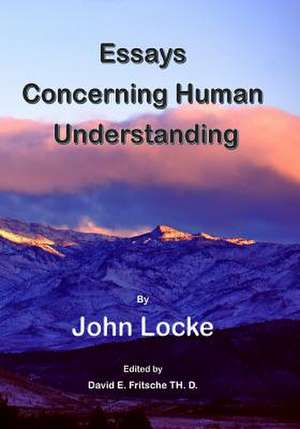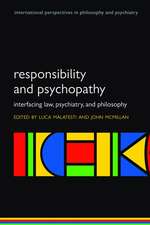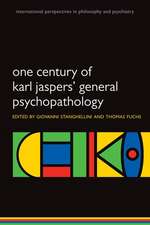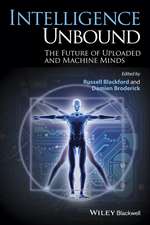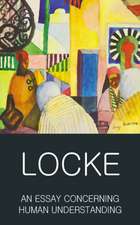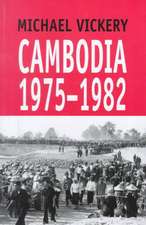An Essay Concerning Human Understanding
Autor John Locke Editat de David E. Fritsche Th D.en Limba Engleză Paperback
| Toate formatele și edițiile | Preț | Express |
|---|---|---|
| Paperback (11) | 81.93 lei 10-16 zile | +32.23 lei 7-11 zile |
| Oxford University Press – 28 aug 2008 | 81.93 lei 10-16 zile | +32.23 lei 7-11 zile |
| Penguin Books – 25 iun 1997 | 82.91 lei 24-35 zile | +33.88 lei 7-11 zile |
| CREATESPACE – | 93.78 lei 3-5 săpt. | |
| Hackett Publishing Company – 15 sep 1996 | 98.56 lei 3-5 săpt. | +25.49 lei 7-11 zile |
| CREATESPACE – | 103.19 lei 3-5 săpt. | |
| CREATESPACE – | 131.67 lei 3-5 săpt. | |
| – | 172.66 lei 3-5 săpt. | |
| CREATESPACE – | 182.07 lei 3-5 săpt. | |
| Digireads.com – 14 iun 2019 | 164.56 lei 6-8 săpt. | |
| HardPress Publishing – 27 ian 2013 | 211.91 lei 38-44 zile | |
| Pomona Press – 31 dec 2006 | 215.32 lei 6-8 săpt. | |
| Hardback (1) | 291.87 lei 6-8 săpt. | |
| Pomona Press – 3 noi 2008 | 291.87 lei 6-8 săpt. |
Preț: 131.67 lei
Nou
Puncte Express: 198
Preț estimativ în valută:
25.20€ • 26.03$ • 20.97£
25.20€ • 26.03$ • 20.97£
Carte disponibilă
Livrare economică 04-18 martie
Preluare comenzi: 021 569.72.76
Specificații
ISBN-13: 9781505926569
ISBN-10: 1505926564
Pagini: 466
Dimensiuni: 178 x 254 x 24 mm
Greutate: 0.8 kg
Editura: CREATESPACE
ISBN-10: 1505926564
Pagini: 466
Dimensiuni: 178 x 254 x 24 mm
Greutate: 0.8 kg
Editura: CREATESPACE
Descriere
Descriere de la o altă ediție sau format:
'I must apply my self to Experience; as far as that reaches, I may have certain Knowledge, but no farther.'In An Essay concerning Human Understanding, John Locke sets out his theory of knowledge and how we acquire it. Eschewing doctrines of innate principles and ideas, Locke shows how all our ideas, even the most abstract and complex, are grounded in human experience and attained by sensation of external things or reflection upon our own mental activities. A thorough examination of the communication of ideas through language and the conventions of taking words as signs of ideas paves the way for his penetrating critique of the limitations of ideas and the extent of our knowledge of ourselves, the world, God, and morals.Locke's masterpiece laid the foundation of British empiricism and is of enduring interest to anyone exploring the development of philosophical thought. This sensitive abridgement uses P. H. Nidditch's authoritative text, and together with an illuminating introduction and other features, makes Locke's arguments more accessible. ABOUT THE SERIES: For over 100 years Oxford World's Classics has made available the widest range of literature from around the globe. Each affordable volume reflects Oxford's commitment to scholarship, providing the most accurate text plus a wealth of other valuable features, including expert introductions by leading authorities, helpful notes to clarify the text, up-to-date bibliographies for further study, and much more.
'I must apply my self to Experience; as far as that reaches, I may have certain Knowledge, but no farther.'In An Essay concerning Human Understanding, John Locke sets out his theory of knowledge and how we acquire it. Eschewing doctrines of innate principles and ideas, Locke shows how all our ideas, even the most abstract and complex, are grounded in human experience and attained by sensation of external things or reflection upon our own mental activities. A thorough examination of the communication of ideas through language and the conventions of taking words as signs of ideas paves the way for his penetrating critique of the limitations of ideas and the extent of our knowledge of ourselves, the world, God, and morals.Locke's masterpiece laid the foundation of British empiricism and is of enduring interest to anyone exploring the development of philosophical thought. This sensitive abridgement uses P. H. Nidditch's authoritative text, and together with an illuminating introduction and other features, makes Locke's arguments more accessible. ABOUT THE SERIES: For over 100 years Oxford World's Classics has made available the widest range of literature from around the globe. Each affordable volume reflects Oxford's commitment to scholarship, providing the most accurate text plus a wealth of other valuable features, including expert introductions by leading authorities, helpful notes to clarify the text, up-to-date bibliographies for further study, and much more.
Notă biografică
John Locke (29 August 1632 - 28 October 1704) was an English philosopher and physician, widely regarded as one of the most influential of Enlightenment thinkers and commonly known as the "Father of Liberalism." Considered one of the first of the British empiricists, following the tradition of Sir Francis Bacon, he is equally important to social contract theory. His work greatly affected the development of epistemology and political philosophy. His writings influenced Voltaire and Jean-Jacques Rousseau, many Scottish Enlightenment thinkers, as well as the American revolutionaries. His contributions to classical republicanism and liberal theory are reflected in the United States Declaration of Independence.
Locke's theory of mind is often cited as the origin of modern conceptions of identity and the self, figuring prominently in the work of later philosophers such as David Hume, Rousseau, and Immanuel Kant. Locke was the first to define the self through a continuity of consciousness. He postulated that, at birth, the mind was a blank slate or tabula rasa. Contrary to Cartesian philosophy based on pre-existing concepts, he maintained that we are born without innate ideas, and that knowledge is instead determined only by experience derived from sense perception. This is now known as empiricism. An example of Locke's belief in empiricism can be seen in his quote, "whatever I write, as soon as I discover it not to be true, my hand shall be the forwardest to throw it into the fire." This shows the ideology of science in his observations in that something must be capable of being tested repeatedly and that nothing is exempt from being disproven. Challenging the work of others, Locke is said to have established the method of introspection, or observing the emotions and behaviours of one's self.
Cuprins
Introduction
Further Reading
Bibliographical Abbreviations
A Note on the Text
Title-page of the Fifth Edition
AN ESSAY CONCERNING HUMAN UNDERSTANDING
The Epistle Dedicatory
The Epistle to the Reader
The Contents
Book I: Of Innate Notions
I Introduction
II No Innate Principles in the Mind
III No Innate Practical Principles
IV Other Considerations concerning Innate Principles, both Speculative and Practical
Book II: Of Innate Notions
I Of Ideas in General, and their Original
II Of Simple Ideas
III Of Ideas of One Sense
IV Of Solidity
V Of Simple Ideas of Divers Senses
VI Of Simple Ideas of Reflection
VII Of Simple Ideas of both Sensation and Reflection
VIII Some further Considerations concerning our Simple Ideas
IX Of Perception
X Of Retention
XI Of Discerning, and other Operations of the Mind
XII Of Complex Ideas
XIII Of Simple Modes; and first, of the Simple Modes of Space
XIV Of Duration, and its Simple Modes
XV Of Duration and Expansion, considered together
XVI Of Number
XVII Of Infinity
XVIII Of other Simple Modes
XIX Of the Modes of Thinking
XX Of Modes of Pleasure and Pain
XXI Of Power
XXII Of Mixed Modes
XXIII Of our Complex Ideas of Substances
XXIV Of Collective Ideas of Substances
XXV Of Relation
XXVI Of Cause and Effect, and other Relations
XXVII Of Identity and Diversity
XXVIII Of other Relations
XXIX Of Clear and Obscure, Distinct and Confused Ideas
XXX Of Real and Fantastical Ideas
XXXI Of Adequate and Inadequate Ideas
XXXII Of True and False Ideas
XXXIII Of the Association of Ideas
Book III: Of Words
I Of Words or Language in General
II Of the Signification of Words
III Of General Terms
IV Of the Names of Simple Ideas
V Of the Names of Mixed Modes and Relations
VI Of the Names of Substances
VII Of Particles
VIII Of Abstract and Concrete Terms
IX Of the Imperfection of Words
X Of the Abuse of Words
XI Of the Remedies of the Foregoing Imperfections and Abuses
Book IV: Of Knowledge and Opinion
I Of Knowledge in General
II Of the Degrees of Our Knowledge
III Of the Extent of Human Knowledge
IV Of the Reality of Knowledge
V Of Truth in General
VI Of Universal Propositions, their Truth and Certainty
VII Of Maxims
VIII Of Trifling Propositions
IX Of our Knowledge of Existence
X Of our Knowledge of the Existence of a God
XI Of our Knowledge of the Existence of Things
XII Of the Improvement of our Knowledge
XIII Some further Considerations concerning our Knowledge
XIV Of Judgment
Xv Of Probability
XVI Of the Degrees of Assent
XVII Of Reason
XVIII Of Faith and Reason, and their Distinct Provinces
XIX Of Enthusiasm
XX Of Wrong Assent, or Error
XXI Of the Division of the Sciences
Further Reading
Bibliographical Abbreviations
A Note on the Text
Title-page of the Fifth Edition
AN ESSAY CONCERNING HUMAN UNDERSTANDING
The Epistle Dedicatory
The Epistle to the Reader
The Contents
Book I: Of Innate Notions
I Introduction
II No Innate Principles in the Mind
III No Innate Practical Principles
IV Other Considerations concerning Innate Principles, both Speculative and Practical
Book II: Of Innate Notions
I Of Ideas in General, and their Original
II Of Simple Ideas
III Of Ideas of One Sense
IV Of Solidity
V Of Simple Ideas of Divers Senses
VI Of Simple Ideas of Reflection
VII Of Simple Ideas of both Sensation and Reflection
VIII Some further Considerations concerning our Simple Ideas
IX Of Perception
X Of Retention
XI Of Discerning, and other Operations of the Mind
XII Of Complex Ideas
XIII Of Simple Modes; and first, of the Simple Modes of Space
XIV Of Duration, and its Simple Modes
XV Of Duration and Expansion, considered together
XVI Of Number
XVII Of Infinity
XVIII Of other Simple Modes
XIX Of the Modes of Thinking
XX Of Modes of Pleasure and Pain
XXI Of Power
XXII Of Mixed Modes
XXIII Of our Complex Ideas of Substances
XXIV Of Collective Ideas of Substances
XXV Of Relation
XXVI Of Cause and Effect, and other Relations
XXVII Of Identity and Diversity
XXVIII Of other Relations
XXIX Of Clear and Obscure, Distinct and Confused Ideas
XXX Of Real and Fantastical Ideas
XXXI Of Adequate and Inadequate Ideas
XXXII Of True and False Ideas
XXXIII Of the Association of Ideas
Book III: Of Words
I Of Words or Language in General
II Of the Signification of Words
III Of General Terms
IV Of the Names of Simple Ideas
V Of the Names of Mixed Modes and Relations
VI Of the Names of Substances
VII Of Particles
VIII Of Abstract and Concrete Terms
IX Of the Imperfection of Words
X Of the Abuse of Words
XI Of the Remedies of the Foregoing Imperfections and Abuses
Book IV: Of Knowledge and Opinion
I Of Knowledge in General
II Of the Degrees of Our Knowledge
III Of the Extent of Human Knowledge
IV Of the Reality of Knowledge
V Of Truth in General
VI Of Universal Propositions, their Truth and Certainty
VII Of Maxims
VIII Of Trifling Propositions
IX Of our Knowledge of Existence
X Of our Knowledge of the Existence of a God
XI Of our Knowledge of the Existence of Things
XII Of the Improvement of our Knowledge
XIII Some further Considerations concerning our Knowledge
XIV Of Judgment
Xv Of Probability
XVI Of the Degrees of Assent
XVII Of Reason
XVIII Of Faith and Reason, and their Distinct Provinces
XIX Of Enthusiasm
XX Of Wrong Assent, or Error
XXI Of the Division of the Sciences
Appendix:
John Locke's Debate with Edward Stillingfleet, Bishop of Worcester, as it figures in footnotes in the Fifth Edition of the Essay
Index to the Fifth Edition
Notes
